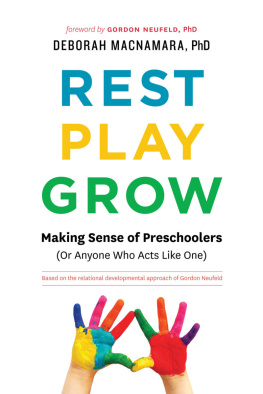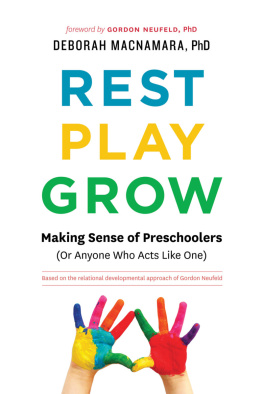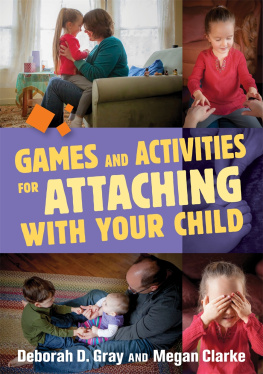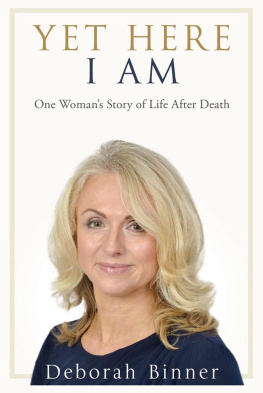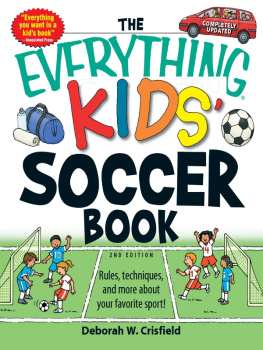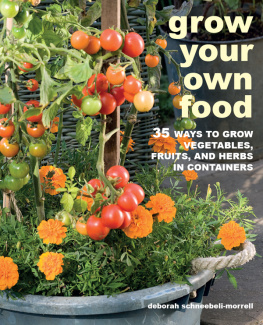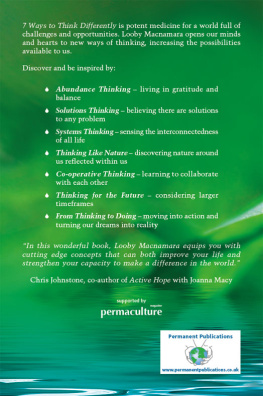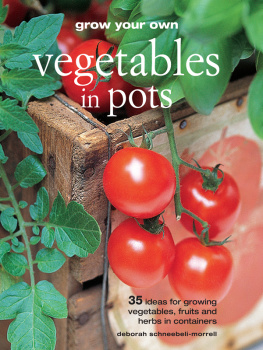Deborah MacNamara - Rest, Play, Grow
Here you can read online Deborah MacNamara - Rest, Play, Grow full text of the book (entire story) in english for free. Download pdf and epub, get meaning, cover and reviews about this ebook. publisher: Deborah MacNamara, PhD, genre: Children. Description of the work, (preface) as well as reviews are available. Best literature library LitArk.com created for fans of good reading and offers a wide selection of genres:
Romance novel
Science fiction
Adventure
Detective
Science
History
Home and family
Prose
Art
Politics
Computer
Non-fiction
Religion
Business
Children
Humor
Choose a favorite category and find really read worthwhile books. Enjoy immersion in the world of imagination, feel the emotions of the characters or learn something new for yourself, make an fascinating discovery.
- Book:Rest, Play, Grow
- Author:
- Publisher:Deborah MacNamara, PhD
- Genre:
- Rating:5 / 5
- Favourites:Add to favourites
- Your mark:
- 100
- 1
- 2
- 3
- 4
- 5
Rest, Play, Grow: summary, description and annotation
We offer to read an annotation, description, summary or preface (depends on what the author of the book "Rest, Play, Grow" wrote himself). If you haven't found the necessary information about the book — write in the comments, we will try to find it.
Rest, Play, Grow — read online for free the complete book (whole text) full work
Below is the text of the book, divided by pages. System saving the place of the last page read, allows you to conveniently read the book "Rest, Play, Grow" online for free, without having to search again every time where you left off. Put a bookmark, and you can go to the page where you finished reading at any time.
Font size:
Interval:
Bookmark:
Why Making Sense Matters
To understand a child we have to watch him at play, study him in his different moods; we cannot project upon him our own prejudices, hopes and fears, or mould him to fit the pattern of our desires. If we are constantly judging the child according to our personal likes and dislikes, we are bound to create barriers and hindrances in our relationship with him and in his relationships with the world.
JIDDU KRISHNAMURTI
A NUMBER OF YEARS ago, I was invited to speak to a group of new parents on the subject of attachment and young children. The room at the community centre was crammed with mothers nursing their babies, rocking them to sleep, or changing their diapers. Car carriers, strollers, and baby bags were piled on top of each other, all with blankets bursting forth. Meredith, the coordinator of the weekly support group, invited the parents to sit on chairs arranged in a circle. She began her check-in with a warm welcome and asked everyone how they were managing. A number of parents replied that they were getting out of the house, some said they had managed to take a shower, and others replied that breastfeeding was going better. A tired-looking mother spoke up and said, My baby cries every time I put her down. I nurse her until she falls asleep, but as soon as I put her in the crib, she wakes up. Im so exhausted. There were nods and sighs of agreement as Meredith responded, Yes, it is hard. You just want some rest and they always seem to need you. More nods of agreement ensued as Meredith paused before continuing, I imagine it is hard for your baby, too. They are transitioning from being inside you 24/7, feeling your warmth, hearing your heartbeat, to never being able to hold you close like that again. The room was silent for a moment and I found myself travelling back to when I first became a parent. I began to feel the mothers apprehension, excitement, and exhaustion viscerally.
Meredith then formally welcomed me to the parent group and introduced me as someone she had invited to speak on the topic of attachment. She emphasized to the mothers the importance of human relationships and said this process of attachment was already unfolding between them and their babies. She had forewarned me that I would have 15 minutes to convey my message because of limited attention spans. I watched the mothers tired and distracted faces as I spoke about what a good attachment looks like and how it serves development. The mothers were thoughtful and attentive, absorbing what they could while focusing on their babies needs.
I stopped after 15 minutes and asked if there were any questions. A mother with a baby snuggled against her looked at me and said, What should I do to discipline him? I was taken abackwhat had her baby done to require discipline? My face must have conveyed surprise because she quickly added, What I mean is how do I discipline him when he is older? The truth is her question was not unlike many Id had as a new mother or that I routinely hear from parents. The questions usually start the same way: What should I do when my child does ? What should I do when my child doesnt listen? What should I do when they wont go to sleep? What should I do when they hit their brother or sister? Yet as I looked at this room bursting with new life, I was unsettled by her question. There was something more critical that I longed to be asked. I wanted her to ask me about the secrets for growth and the unlocking of human potential. I wanted to share with her the wonder of development and her role in it. Her question about discipline could be answered only by first considering how young children thrive and flourish. I wanted to take a step back from focusing on what to do in the moment and consider what she could do to create the conditions for healthy development. I wanted to focus on maturity as the ultimate answer to immaturity and how parenting is about patience, time, and good caretaking.
The message I wanted to convey isnt one new parents typically hear. I wanted to reveal that the secret to raising a child isnt about having all the answers but about being a childs answer. I wanted to share with them that parenting isnt something you can learn from a book, though books can help when youre trying to make sense of a child. I wanted to express that parenting isnt something you learn from your own parents, though great ones are wonderful templates. I wanted to reaffirm that caring for a child knows no gender, age, or ethnicity. I wanted to reassure them that their feelings of responsibility, guilt, alarm, and caring were the instinctive and emotional underpinnings of becoming the parent their child needs. I wanted to convey that what every child requires is a place of rest so that they can play and grow. This doesnt require perfection from a parent, or knowing what to do all the time. What it requires is a yearning to be their childs best bet and to work at creating the conditions to foster their growth.
YOUNG CHILDREN ARE some of the most loved people around, but they are also some of the most misunderstood. Their unique personalities can be challenging for adults, as they routinely defy logic and understanding. They can act brazen, noncompliant, and defiant one minute, only to turn around and light up a room with their infectious giggles and joy. Given the unpredictable nature of young children, it is understandable why parents long for techniques and tools to deal with their immature behaviour. The problem is, instructions wont help a parent make sense of a child.
Becoming a childs best bet requires understanding them from the inside out. It requires insight, not skill. It is more about what we see when we look at our child than it is about what we do. It is about being able to hold on to the big developmental picture instead of getting lost in the details of daily living. Simply put, perspective is everything. If we see a young child as being in distress, we may seek to comfort them, but if we see a child as being manipulative, we may back away. If we see a young child as being defiant, we may move to punish them, but if we understand that children have instincts to resist, we can find a way through the impasse. If we see a young child as being too emotional, we may try to calm them down, but if we understand that strong emotions need to be expressed, we will help them learn a language of the heart. If we see a young child who cannot focus as having a disordered brain, we may medicate them, but if we see them as being immature, we may give them some time to grow up.
When we make sense of a childwhen we start to understand the developmental reasons for their actionstheir aggression can feel less personal, their opposition less provocative, and our focus can turn to creating the conditions that foster growth. It is hard to make headway with behaviour when we dont understand what is driving it, or when our own emotions cloud the picture. Charlie, a father of two young children, said, I used to be the most laid-back person around. You could ask any of my friends and theyd say I was the most easygoing out of all of them. Now that I have children, I think I have an anger management problem. Similarly, Samantha, a mother of two young boys, wrote, I have come to realize my kids arent trying to grate on my single last nerve and I have started to enjoy them again. The bottom line is, our reactions to young children are based upon what we see, which ultimately informs what we do. Most importantly, what we do informs our child about the type of care they can expect from us.
Young children represent immaturity at its best and illuminate the raw beginnings from which we grow. Although we may watch their immature ways in horror, we may also be filled with awe and wonder as human life renews itself again. The secret to unlocking the ancient patterns of human growth lies not in
Font size:
Interval:
Bookmark:
Similar books «Rest, Play, Grow»
Look at similar books to Rest, Play, Grow. We have selected literature similar in name and meaning in the hope of providing readers with more options to find new, interesting, not yet read works.
Discussion, reviews of the book Rest, Play, Grow and just readers' own opinions. Leave your comments, write what you think about the work, its meaning or the main characters. Specify what exactly you liked and what you didn't like, and why you think so.

